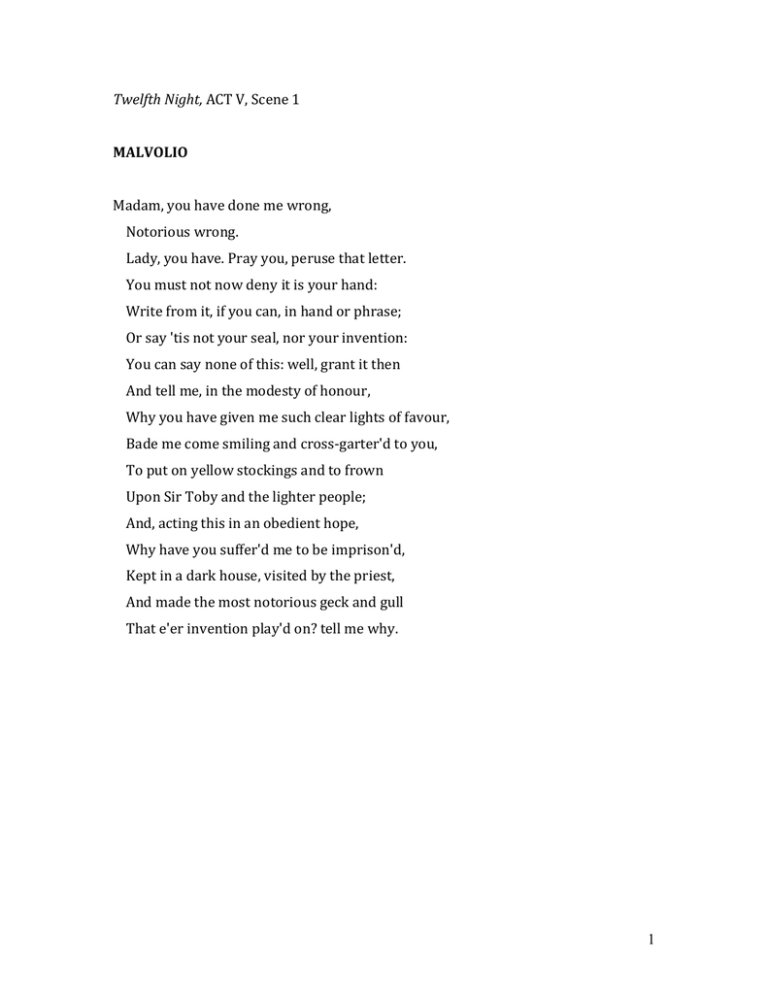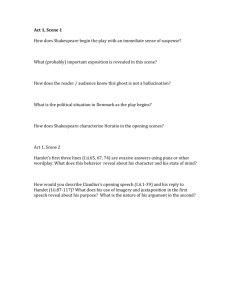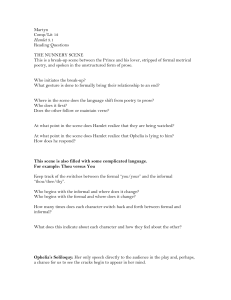Here - Lincoln School
advertisement

Twelfth Night, ACT V, Scene 1 MALVOLIO Madam, you have done me wrong, Notorious wrong. Lady, you have. Pray you, peruse that letter. You must not now deny it is your hand: Write from it, if you can, in hand or phrase; Or say 'tis not your seal, nor your invention: You can say none of this: well, grant it then And tell me, in the modesty of honour, Why you have given me such clear lights of favour, Bade me come smiling and cross-garter'd to you, To put on yellow stockings and to frown Upon Sir Toby and the lighter people; And, acting this in an obedient hope, Why have you suffer'd me to be imprison'd, Kept in a dark house, visited by the priest, And made the most notorious geck and gull That e'er invention play'd on? tell me why. 1 Twelfth Night – Act V, Scene 1 Olivia Alas, Malvolio, this is not my writing, Though, I confess, much like the character But out of question 'tis Maria's hand. And now I do bethink me, it was she First told me thou wast mad; then camest in smiling, And in such forms which here were presupposed Upon thee in the letter. Prithee, be content: This practise hath most shrewdly pass'd upon thee; But when we know the grounds and authors of it, Thou shalt be both the plaintiff and the judge Of thine own cause. 2 Hamlet – Act V Scene 1 HAMLET Alas, poor Yorick! I knew him, Horatio: a fellow of infinite jest, of most excellent fancy: he hath borne me on his back a thousand times; and now, how abhorred in my imagination it is! my gorge risess at it. Here hung those lips that I have kissed I know not how oft. Where be your gibes now? your gambols? your songs? your flashes of merriment, that were wont to set the table on a roar? Not one now, to mock your own grinning? Now get you to my lady's chamber, and tell her, let her paint an inch thick, to this favour she must come; make her laugh at that. 3 Hamlet – Act IV Scene 7 QUEEN GERTRUDE There is a willow grows aslant a brook, There with fantastic garlands did she come There, on the pendent boughs her coronet weeds Clambering to hang, an envious sliver broke; When down her weedy trophies and herself Fell in the weeping brook. Her clothes spread wide; And, mermaid-like, awhile they bore her up: Which time she chanted snatches of old tunes; As one incapable of her own distress, Or like a creature native and indued Unto that element: but long it could not be Till that her garments, heavy with their drink, Pull'd the poor wretch from her melodious lay To muddy death. 4 Hamlet – Act III, Scene 1 HAMLET To be, or not to be: that is the question: Whether 'tis nobler in the mind to suffer The slings and arrows of outrageous fortune, Or to take arms against a sea of troubles, And by opposing end them? To die: to sleep; No more; and by a sleep to say we end The heart-ache and the thousand natural shocks That flesh is heir to, 'tis a consummation Devoutly to be wish'd. To die, to sleep; To sleep: perchance to dream: ay, there's the rub; For in that sleep of death what dreams may come When we have shuffled off this mortal coil, Must give us pause: there's the respect That makes calamity of so long life; Thus conscience does make cowards of us all. 5 Hamlet – Act I, Scene 2 HAMLET How weary, stale, flat and unprofitable, Seem to me all the uses of this world! Fie on't! O fie! 'tis an unweeded garden, That grows to seed; things rank and gross in nature Possess it merely. That it should come to this! But two months dead! -nay, not so much, not two: So excellent a king; that was, to this, so loving to my mother Heaven and earth! Must I remember? why, she would hang on him, and yet, within a month-Let me not think on't--Frailty, thy name is woman!-- 6 Hamlet – Act I, Scene 2 HAMLET --Frailty, thy name is woman!-A little month, or ere those shoes were old With which she follow'd my poor father's body, O God! A beast would have mourn'd longer— --married with my uncle, My father's brother, but no more like my father Than I to Hercules: within a month: She married. It is not nor it cannot come to good: But break, my heart; for I must hold my tongue! 7 Hamlet – Act II, Scene 2 HAMLET I have of late--but wherefore I know not--lost all my mirth, forgone all custom of exercises; and indeed it goes so heavily with my disposition that this goodly frame, the earth, seems to me a sterile promontory, this most excellent canopy, the air, look you, this brave o'erhanging firmament, this majestical roof fretted with golden fire, why, it appears no other thing to me than a foul and pestilent congregation of vapors. What a piece of work is man! how noble in reason! how infinite in faculty! in form and moving how express and admirable! in action how like an angel! in apprehension how like a god! the beauty of the world! the paragon of animals! And yet, to me, what is this quintessence of dust? man delights not me: no, nor woman neither, though by your smiling you seem to say so. 8 Hamlet – Act I, Scene 2 KING CLAUDIUS 'Tis sweet and commendable in your nature, Hamlet, To give these mourning duties to your father: But, you must know, your father lost a father; That father lost, lost his, but to persever In obstinate condolement is a course Of impious stubbornness; 'tis unmanly grief; It shows a will most incorrect to heaven, We pray you, throw to earth This unprevailing woe, and think of us As of a father: for let the world take note, You are the most immediate to our throne; And with no less nobility of love Than that which dearest father bears his son, Do I impart toward you. 9 Hamlet – Act III Scene 1 OPHELIA O, what a noble mind is here o'erthrown! The courtier's, scholar's, soldier's, eye, tongue, sword, Th' expectancy and rose of the fair state, The glass of fashion and the mould of form, Th' observ'd of all observers- quite, quite down! And I, of ladies most deject and wretched, That suck'd the honey of his music vows, Now see that noble and most sovereign reason, Like sweet bells jangled, out of tune and harsh; That unmatch'd form and feature of blown youth Blasted with ecstasy. O, woe is me T' have seen what I have seen, see what I see! 10 Hamlet – Act II, Scene 1 OPHELIA He falls to such perusal of my face As he would draw it. Long stay'd he so. At last, a little shaking of mine arm, And thrice his head thus waving up and down, He rais'd a sigh so piteous and profound As it did seem to shatter all his bulk And end his being. That done, he lets me go, And with his head over his shoulder turn'd He seem'd to find his way without his eyes, For out o' doors he went without their help. And to the last bended their light on me. 11 Hamlet – Act II, Scene 1 OPHELIA O my lord, my lord, I have been so affrighted! My lord, as I was sewing in my closet, Lord Hamlet, with his doublet all unbrac'd, Pale as his shirt, his knees knocking each other, And with a look so piteous in purport As if he had been loosed out of hell To speak of horrors- he comes before me. He took me by the wrist and held me hard; Then goes he to the length of all his arm, And, with his other hand thus o'er his brow, He falls to such perusal of my face As he would draw it. 12 Hamlet – Act I, Scene 3 POLONIUS Yet here, Laertes? There- my blessing with thee! And these few precepts in thy memory Look thou character. Give every man thine ear, but few thy voice; Take each man's censure, but reserve thy judgment. Costly thy habit as thy purse can buy, But not express'd in fancy; rich, not gaudy; For the apparel oft proclaims the man, Neither a borrower nor a lender be; For loan oft loses both itself and friend, And borrowing dulls the edge of husbandry. This above all- to thine own self be true, And it must follow, as the night the day, Thou canst not then be false to any man. Farewell. My blessing season this in thee! 13





